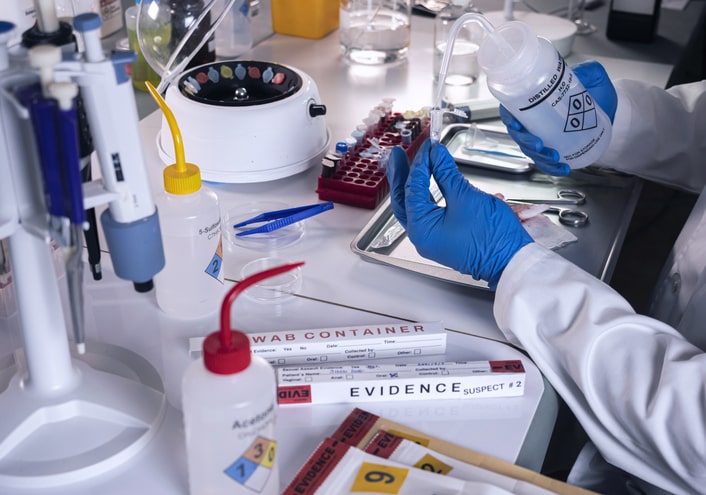Can You Challenge DNA Evidence in a North Carolina Sex Crime Case?
By KevinMarcilliat, In Sex Crimes, 0 CommentsAt Marcilliat & Mills, PLLC, our experienced Charlotte criminal defense attorneys know challenging DNA evidence in a sex crime case requires a strategic and multifaceted approach, given the weight such evidence can carry in court.
However, this potential defense strategy is unique to each case because the circumstances surrounding the collection, handling, and analysis of the DNA are distinct for every situation.
Additionally, the context in which the DNA evidence is presented—such as whether it supports a claim of consent or disputes the defendant’s presence at the scene—can influence the strategies used to challenge it.
Each of these variables requires a tailored approach to questioning the validity and interpretation of the DNA evidence. Considering the case’s specific details is essential when mounting a defense, which is why we are here.
Our skilled sex crimes defense lawyers in North Carolina guide clients in determining when to challenge DNA evidence because they have the expertise to assess the evidence’s relevance, accuracy, and impact. Here, we discuss what that might entail.

Questioning the Collection and Handling of DNA Samples
One of the most common challenges involves scrutinizing the chain of custody. If the DNA sample was mishandled or there are gaps in the documentation showing how the evidence was collected, stored, and transferred, the integrity of the evidence can be called into question.
Any break in the chain of custody can raise doubts about whether the DNA sample was contaminated, mislabeled, or tampered with.
We can also argue that the DNA was collected improperly, which could lead to contamination or degradation of the sample. For instance, if investigators did not follow proper protocols in collecting the DNA evidence, such as using sterilized tools or gloves, this could compromise the sample.
Challenging the Laboratory Analysis
Laboratories are not infallible, and errors can occur during the analysis of DNA samples. Mistakes include improper testing procedures, cross-contamination between samples, or clerical errors. The defense can request the lab’s protocols and examine if they were followed correctly. Any deviation from standard procedures can cast doubt on the reliability of the results.
In cases where the DNA evidence includes mixed profiles from multiple individuals, it can be challenging to link the defendant to the crime conclusively. We can argue that the DNA results are inconclusive or that the defendant’s DNA could have been present due to innocent reasons, such as secondary transfer.
Questioning the Statistical Interpretation of DNA Evidence
DNA evidence often involves statistical analysis to determine the likelihood that the DNA sample matches the defendant. Our Charlotte sex crimes attorneys can challenge the methods used to calculate these probabilities, mainly if the software or models used are proprietary or not widely accepted in the scientific community.
Prosecutors may present DNA evidence as overwhelmingly conclusive, but we can argue that the statistical probability is not as definitive as portrayed. This involves showing that the DNA match is not unique to the defendant but could also match a significant portion of the population.
Alternative Explanations for the Presence of DNA
Our sex crimes lawyers in Charlotte can argue that the defendant’s DNA was transferred to the crime scene or victim indirectly, such as through a handshake or shared objects, rather than being deposited during the commission of the crime.
In some sex crime cases, the defense may argue that the sexual encounter was consensual, which would explain the presence of the defendant’s DNA without implying guilt of a crime.
Using Expert Testimony
Our lawyers can call forensic experts to testify about limitations and potential flaws in a specific DNA analysis. These experts can explain to the jury the possibility of errors, contamination, or misinterpretation of the DNA evidence, helping to undermine the prosecution’s case.
Requesting Independent Testing
Our dedicated sex crime defense lawyers in Charlotte can request that the DNA evidence be re-tested by an independent laboratory. This can either confirm the prosecution’s findings or, more ideally, produce different results that could favor the defense. Independent testing can also be used to verify the reliability and accuracy of the original analysis.
Challenging DNA evidence effectively requires a thorough understanding of forensic science and meticulous examination of how the evidence was collected, handled, and analyzed. By raising doubts about the reliability of DNA evidence, we can weaken the prosecution’s case and increase the chances of a favorable outcome for the defendant.
Contact Our Skilled Charlotte Sex Crime Defense Attorneys Today
If you have been charged with a sex crime based on DNA evidence in North Carolina, Contact our skilled Charlotte sex crime defense attorneys today to learn more about our strategic federal defense strategies and how we can put our over 60 years of combined experience to work for you.









